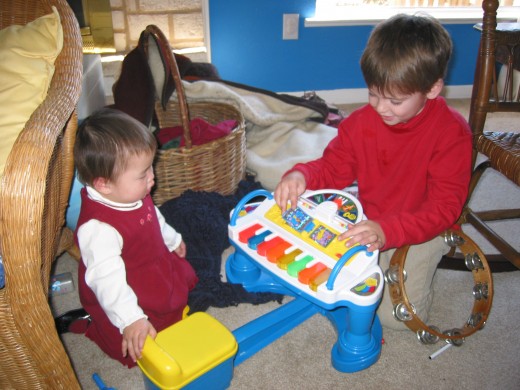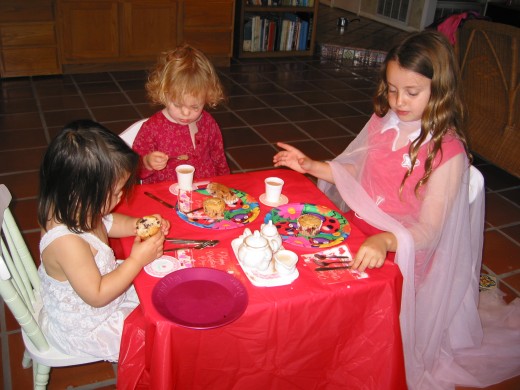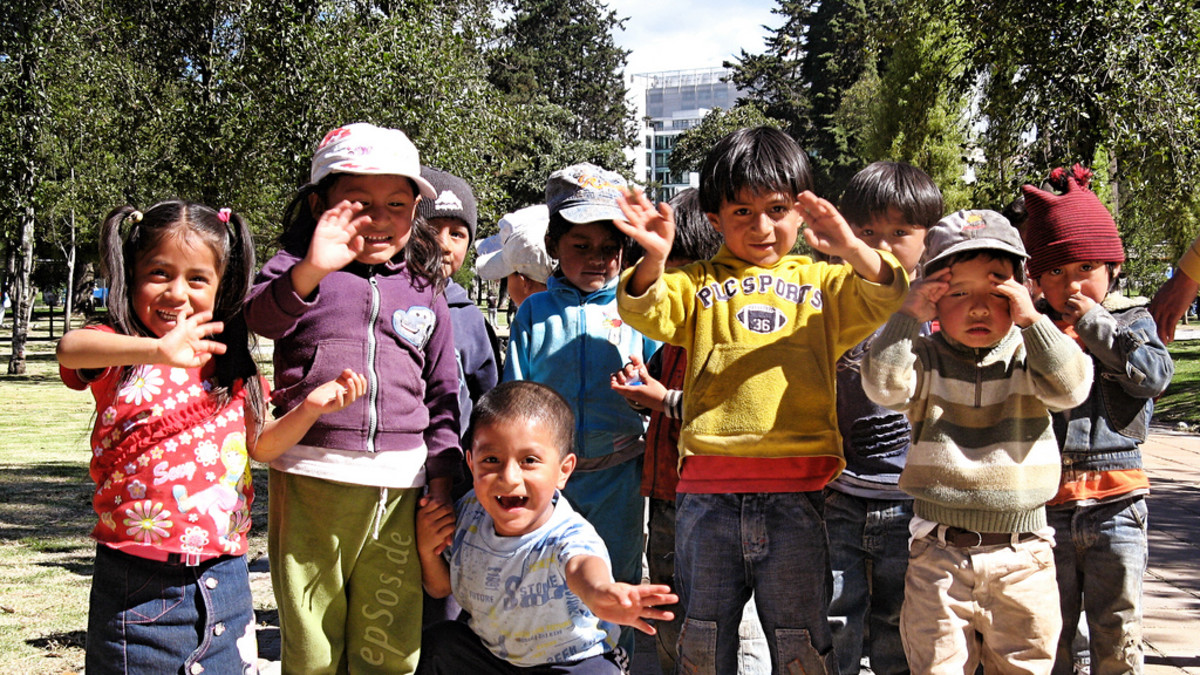- HubPages»
- Family and Parenting»
- Parenting Skills, Styles & Advice»
- Parenting Advice & Tips
5 Tips for Helping Siblings Get Along
Experienced Advice
As the parents of 5 children, my husband and I work hard to help our children be friends. Sometimes it isn't easy, and I know how hard it can be to listen to your kids be mean to one another. Although no parent can make their children be friends, there are a lot of things that parents can do which help set the environment so that their kids can learn to appreciate each other. Here my top 5 tips:
Sibling Quiz
view quiz statistics1. Work on Projects as a Family
Need to paint a room? Clean out a closet or the garage? How about setting up the Christmas decorations?
Kids Like to Do Projects with Parents. Kids like to be considered old enough to help and even though it is sometimes more difficult to have them help at first, after a while, if you teach them, they can take over the tasks that you dread (like deciding where the Christmas lights should go, which my oldest daughter did for us last year!).
Projects Teach Kids to Work Together. When you work together on a task, you sometimes run into conflicts and tempers, but by working through them, you teach your kids how to handle those emotions and also how to work them out. Better yet, as you finish the project, you can feel a sense of bonding through recognizing your accomplishment.
Helping on a Project Makes Kids Feel Valued. Another way to reduce sibling conflict is to make each child feel that they make an important contribution to the family. Completing a project together gives everyone a sense of accomplishment as well as deep feelings of love and bonding within the family.
Our Family
Click thumbnail to view full-size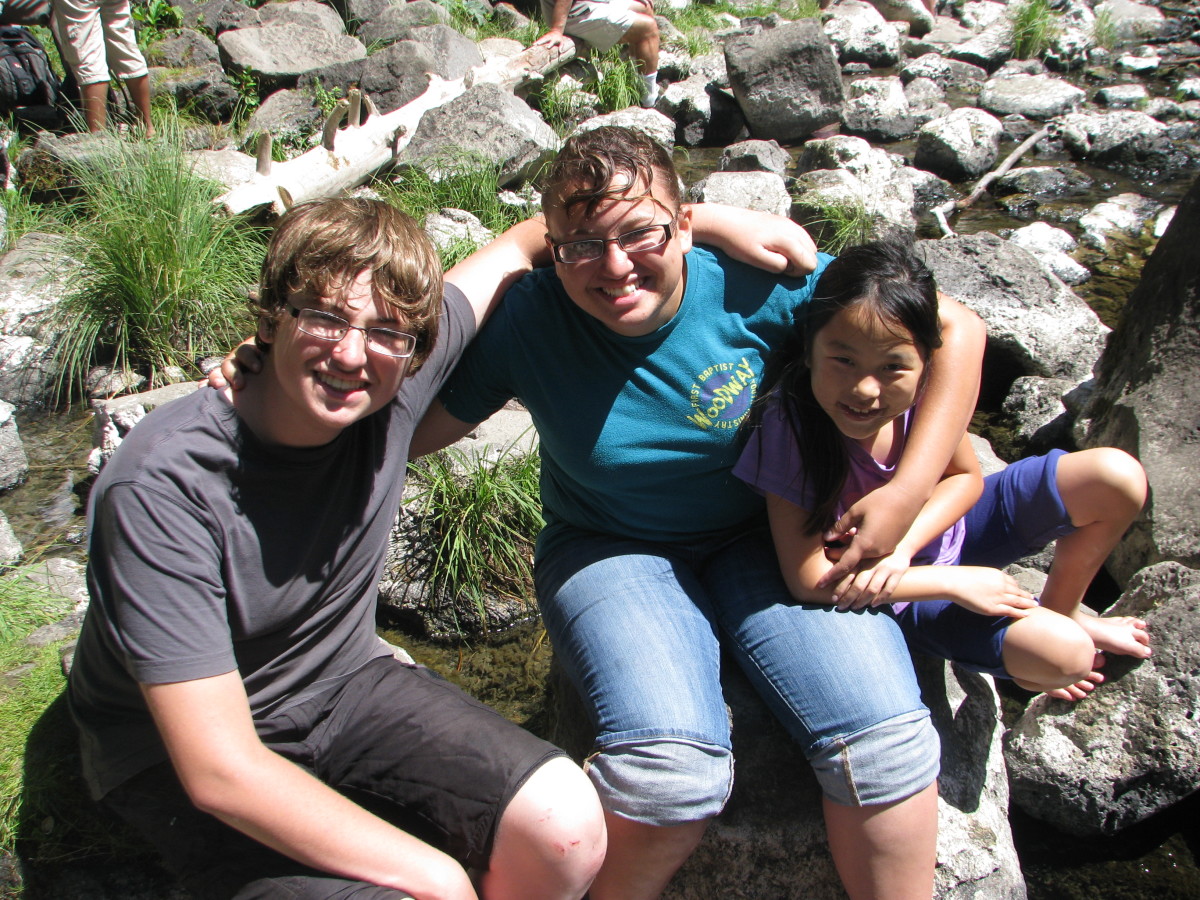
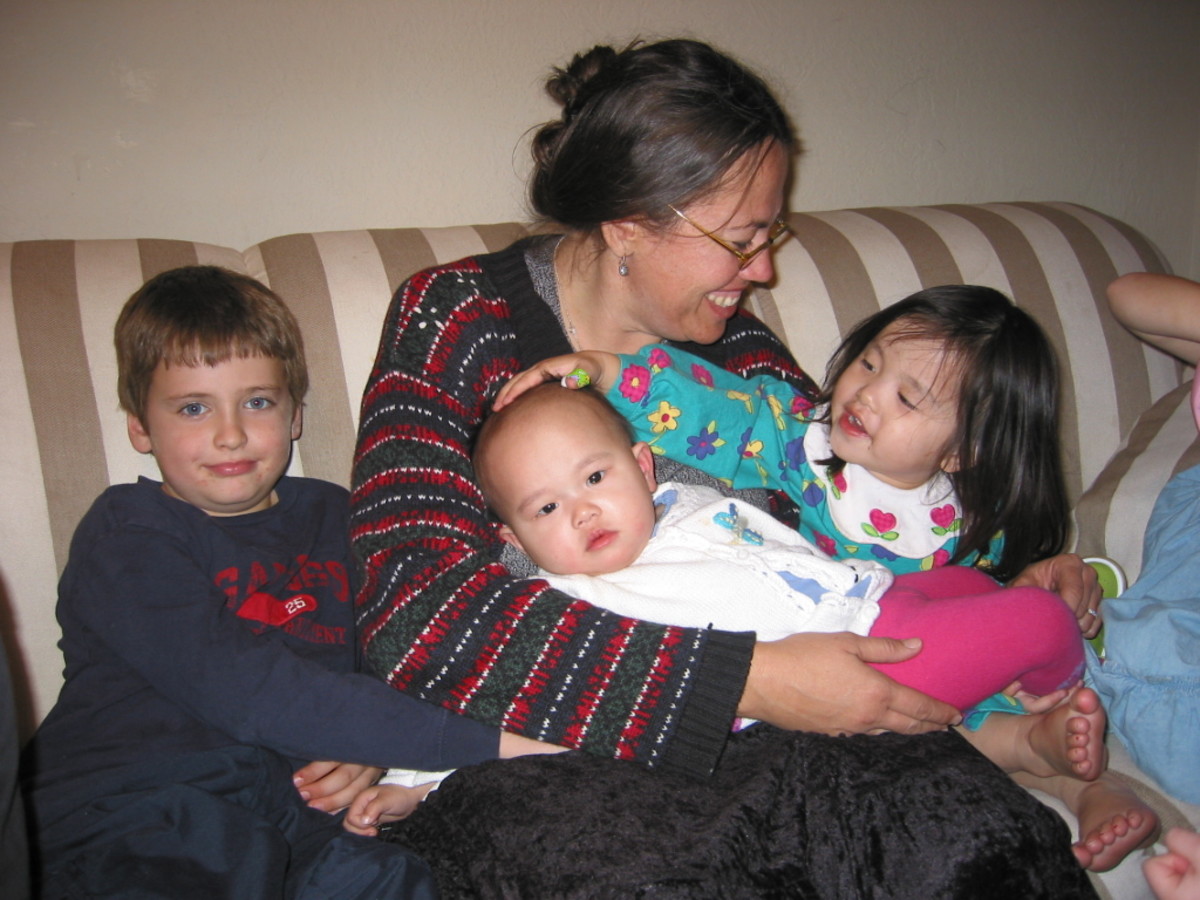
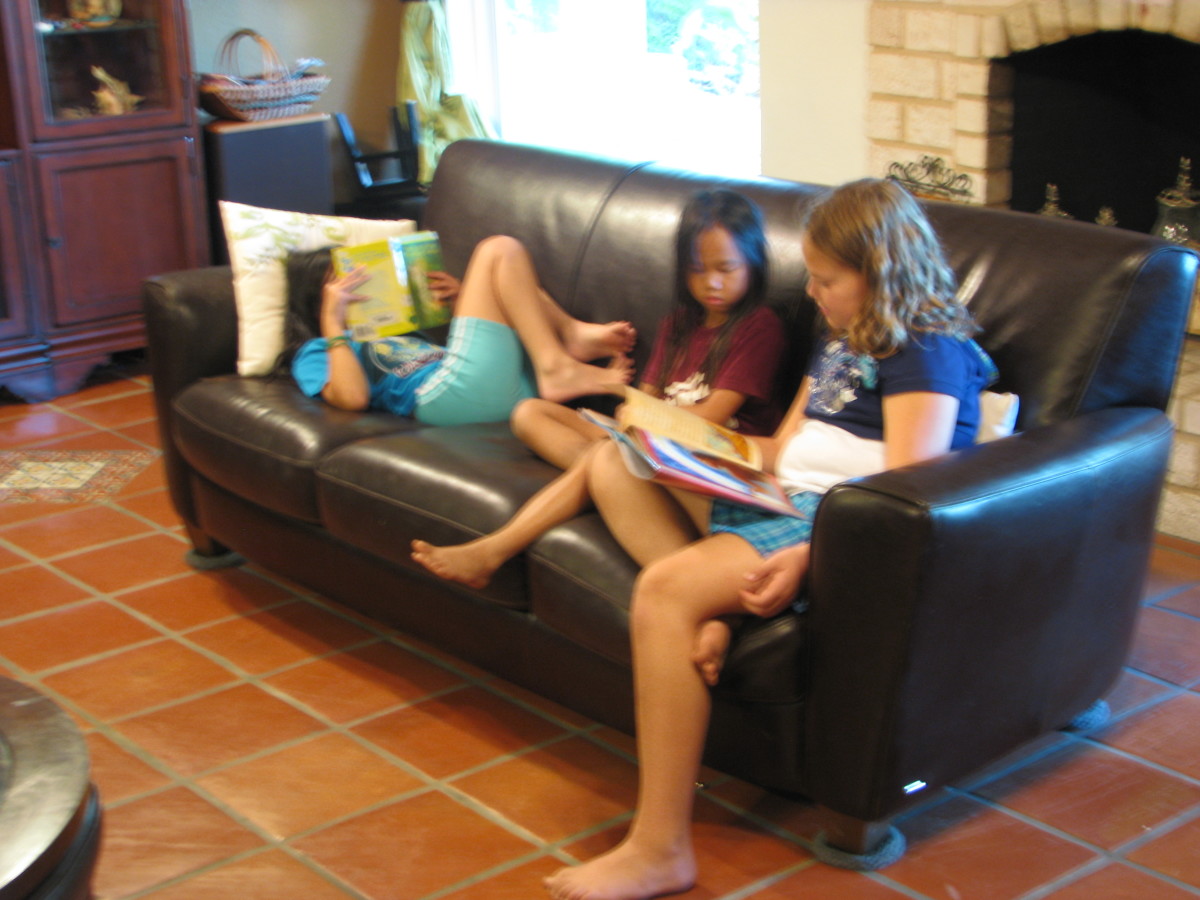


2. Individual Time with Parents
With 5 children, spending time individually with each child has been a challenge, but I'm reminded often of Susannah Wesley, wife of John Wesley, who started the Methodist movement. She had 16 children! One of her goals was to spend individual time with each of them during the week. If she could do it, with all the daily tasks of her household, so can I.
Why is Regular Time with Parents Important? Each child needs to know that if they have something they are worried about, there is a time during the day or week that they know their parents will be available to hear about it. Having regular times to listen to a child makes that child feel more secure. When they feel more secure with their parent's love, they won't be as jealous of their siblings and that makes the sibling bond more secure.
How to schedule regular time with children? It doesn't always have to be a special date. Fit those regular talking times into your everyday life.
- Riding in the car is a great time to talk. Don't have kids play games and don't listen to the radio. If the car is silent, it will encourage you to talk with one another. Be sure to think of questions that will spur conversations. This is a discipline for parents as well as kids!
- Schedule Regular Times Out: For the past year, my husband has taken our youngest 3 out to breakfast at our local donut shop every Saturday, and then sometimes to the park or shopping. He takes time during this regular outing to find out how they are doing and what is happening in their lives. He takes our son out every Saturday for lunch so that they can talk. He takes our daughter Maggie out for periodic trips to the bookstore or Starbucks.
- Go on a walk: Need to get more exercise? Take your kids with you. When mine were younger, we'd head out in a stroller. Now they walk with me and the dog. Recently, we've started bike riding too!
- Play a Game: Whether it is a video game or a board game, kids enjoy it when you play with them. We are always trying to get our kids to get away from the computers, so suggesting a board game or cards is a great way to have a chance to have fun and talk.
- Read to them: As soon as my little ones would sit in my lap, I read to them before nap and bed every night. Often during these times, I would get all sorts of questions. At first, that would annoy me because it interrupted the story, but eventually, I realized that those questions came because they had been waiting all day for these few minutes of concentrated attention that they knew they would get from me. I read every night to my older two until they hit Junior High, and I still read to my 3 youngest.
- Do Some Chores: Whether it is washing the car, or folding laundry, your kids will enjoy doing something with you and that can give you time to talk together. My youngest has actually been finding her special place in the family through deciding that she wants to be the one who is most organized, neatest and best able to do chores when mom asks!
3. Friends Outside the Family
Everyone needs friends outside the family and every child feels better about themselves if they have secure friendships. If you live in a neighborhood with plenty of kids to play with, that is terrific. If like us, you don't have kids for all your children to play with, you may have to do a little work to help your children develop good friendships.
Make Your House Inviting: Children develop friendships easily if they spend enough time together. So help your children make friends by inviting friends over to your house, or taking friends on playdates or meeting parents and their children at the park. At first, this can be a lot of work, but as you become more comfortable with other parents, you don't always have to make elaborate plans for a play-date. My kids now often just call up their friends and arrange the play-date themselves.
Friends Cut down on Rivalry. This works two ways, when kids feel secure in friendships, they don't have to bicker with their sibling. The other thing I've often found to be true is that my kids just get along much better when a friend is over to help give them new inspiration in play.
Parent Messages
4. Identify Unique Traits
Make Sure Each Child Has a Special Place in the Family: Notice what your child does which is positive, or interests they have which are unusual and encourage those traits. How? Tell them that their interest or ability is special. Give them opportunities to develop that trait more by enrolling them in a class, or taking them to the library to find books on that subject or connecting them to an adult who is knowledgeable about that subject. A lot of times, it is best if the child has a special place with is not like either of the parents. My husband calls that giving the child "a space of their own."
- My Son the Engineer. For example, my son Brendan has taken the special place of being the fixer of things and builder when he was younger and now at 15, he is planning to become an engineer. It started when he developed a passion for Lego's at about 7. We encouraged him by complimenting him on his building skills, listening to him talk about his creations, telling other people about his interests when they came to visit, giving him Lego birthday parties and decorating his room in a Lego theme with plenty of space to display his building projects.
- My Daughter the Artist. My daughter, Maggie, on the other hand, loves books and art. So we've supplied her with art supplies and given her encouragement in creating. She and I have a store called Magpie where we display and sell her art. She took an art class in school and has gone through many books of art techniques in learning to develop her style.
- How Siblings Bond: Because both Maggie and Brendan have a unique place in the family, they have been able to resolve their differences and be less competitive with each other. Now that they are in High School, they have discovered a common interest in singing, watching Dr. Who, and watching the same shows and movies.
Time Together
Click thumbnail to view full-size




5. Family Vacations
Family Trips are Concentrated Time Together: When you go on a family vacation, your kids will only have one another to play with and that can be uncomfortable at first, but ultimately teaches them how to get along better. Moreover, on a vacation, the parents are not as busy with work and taking care of the house. They have time to listen, play games and do things together.
Short Trips: Along with taking longer vacations, think about scheduling shorter day trips to go with one child or the whole family. This last year, we went to the State Fair, and on some day trips to children's museums. Those day trips really made us feel we had taken a break and also gave the kids time to enjoy one another outside of the pressures of school
One Parent Trips, or Two Siblings Together: Now we are also planning short trips where one parent takes one or two children on an overnight outing camping, shopping at a special mall, or going to the theatre. We are also encouraging bonding between our children by giving them special trips together to see grandmother, two at a time. We are hoping that these trips create great memories!


